�
������, ���������, ������ / CHILDREN TOYS, DREAMS / ENFANTS, JOUETS, REVES
�
����� ��������, ������ 31 ����� - 18 ������� 2005, ������� ������ �������, �����
Maria Papafili, Exhibition May 31 - June 18 2005, Art Gallery Ekfrasi, Athens, Greece
Maria Papafili, Exposition 31 Mai - 18 Juin 2005, Galerie Ekfrasi, Ath�nes, Gr�ce
�
�
� ������ / THE EXHIBITION / L'EXPOSITION
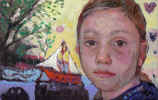 2���
2��� 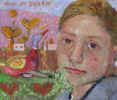 3�� �
3�� �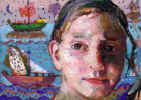 �4��
�4�� 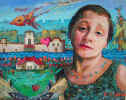 �5����
�5����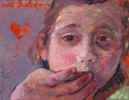 6�� �
6�� � �7����
�7����
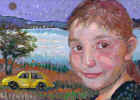 8����
8����  �9����
�9����
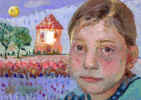 10��
10��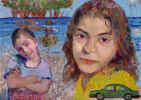 11��
11��  �12��
�12�� 13����
13����
 19���
19���  20���
20��� 21�
21� 22���
22���  23���
23���  24���
24��� 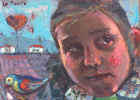 25����
25����
 26��
26��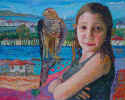 27���
27���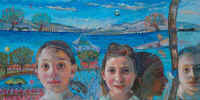 28����
28����  29���
29���  30��
30�� 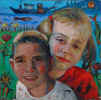 31
31
�
� ��������� / THE INVITATION / L'INVITATION
�������� ������ ���� ����� ���� ����������� ��� �� ��� ����� �� ���������� ������� / Please click on the images to view them in bigger size.�
Copyright art and photos � ����� �������� / Maria Papafili
�
���������� / VISITORS / VISITEURS
�������� ������ ���� ����� ���� ����������� ��� �� ��� ����� �� ���������� ������� / Please click on the images to view them in bigger size.�
Copyright art and photos � EURAN, European Art Networks. / Photos by Katerina Kotti�
�
���������� / Biography / Biographie: www.euran.com/mariapapafili.htm
_________________________________________________________________________�
�
������� �������
�
� ���������� ���� ���������
���� � ����� ����������� ������������ ���� ��� �� ���������, ���� ���� ���� ���� ��� ������ ��� �����������
��� ������. ��� ����� ��� ������� �������������� ������ �������� ��� ���� ����� �������� � ���� ��� ����, ���� ��� � ��������� �������� �������� ���� �� ���, ���
�� ������������ ���� ���������� �� ��������� ��� ���
����. ��� �� �������, ���� ��� ���������� ��� ��� ������� ��� ����� � ������� ��� ��������, �������������� ��
����� �� ������, �� �������� �� ��������, �������� ��
������ ���������������.
� ����� �������� ���������, ����� ���� ������, ����
������������� ������� ������ ���������� ������������, ���� ��� ����� ��� ����� ��� �� ���������� ����
������ �������, ���� ��� ����� ������������ ������� �
������ ��� ������������� ��� �� ������ �� ���� ������������, ����������������� ��� ���� ��������� ����������� ����. �� �������� ��� ����� ��������� ������ �� ������������ ���� ���� �������� ��� ����������� ��� ���������, ���� ������ ��� ���� ������� �� ������� ����� ��
������� ������� �����, ��������� � ������������, ����� ������� ��� ����������, ���� ����� ���� ��� ����������� ���� ��� �������, ���� ���� ������������� ���� ��
�����, ���� �� ��������, ������ ��� ������ ���� ����
������, ���� �� ������� ��� �������������� ����������. ����, ��� ������ �� ������� ��� ���� ����...
� ��� ������ �������� ���������, ������������ ����������� ���, ��������� ������� ��� ��� ������� �����������, ���������� ��� ����� �� ���������� �� ��
�������� ��������������. ��� ��� �� �������� ��� �������� ��������� ��� ��������, ���� ������, ��� �� �������� ��� ���� ���� �������� ��� ������ ���� �����. ��������� ������ ��� �����, ��� ����� ���� ��������, ��������� ������� ��� ����� �������������, ����� �� ����
���� � �������� ������� ��� ��������, �� ������� ��������� ���� ���������, ����������� ����������� ��� ���
��������� ������ ��� ������������ ��� ������������ ���������� ������. ��� ���� �� ��������� ��� �� ����������, ����������� ��� ������ ��������� ��� �� ������������ �����, ���������������, �������� ��� ��� ���������, ��������� ����� ������. � �������� ���������
���� �� ������� ������ ��� ���� ��� �� �������� ��� �������� ��� ��� ����������� ���� �����.
��� �� ����� ����� -�� ����;- �� ������. ��� ������ ���
�������� ���� ����� ����������, �� ���������������
�������� ��� ��������, �� ������ �������������� ��� ������, ��� �� ������������ ������� ��� ����� ��� �� ������ ��� �������, ��� �� ���� ������, ���������� ��� ������������ ��� ������ ��� ��������. ���� ��� ��� ���������������� ��� ������������ ��� ������ ���, ����
����� ����� �������� �� ������� ����� ��� �����, ��������� �� ���������� ��������� ������ �� ������������
�����������, ��� ����� ����� ������������� ������ ���
����������� ��� ��������� ���� ������� ���������������. ��� � ������ �������� �� ������������� ����� �� �������, ��� ��� ����� ����������� ���������, ������ ��������� � ������������ ����������, ����, ��� ���������, ������������� ���� ��������� ��� ������, �������, �������� ��� ������� ���� �����������, ���� ����������������, ���������, ������� ��� �����������. ����� �������
�� ������ ���� ���������� ������������� �������: ���
���� � ������ �� ���������� � ��������� �� ��������.
���, � �������� ������ ���������������, ��������
��������������, ��� ��� ������������ �������� ��� �������, ��������������� ��� ��������� �������, ��� ������� ��������. ����� ��� � ����� ����� ���������� �����������, ���� ���� �������� ��������� ������� �� ���
�����, ��� ����, ��� ������������... � ����������� �������� �������� ��� ������������ �� ��� ��������� ���� ������������ ������ �������, ��������� �� ��������� ��� ��
������� ��� �����, ��� ��� �� ������������ ���� ���������� �� ��� �������������� ���������, �� ���� ��������
����������, ���� ��� ����� ���� �� ��������, ��� ������
�� ���������� ���� � ��������� ������ ����� ������ ���
�������� ��� ����������. ��� ��� �� ������ ���� �������
�������� ��� ������� �� �� �������, ������������ ��
�������� ��� �������� ��� ������ ���� ��� � ��������.
��� ����� ��� �� ��������� �� ����� �������, �����
��� ���������� ��������, ������������� �� �������� ��������� ��� ���� ���������� ����������. � ��������
������������ �� ������ ��� ���������, �� ����� � ������
�������� ��� ������������ ��� ������� ��������������
�� ��������������� ���������� ���������, ��������
���������� �������� ��� �� ������ ��� ������, ���� ��
���� ����������� ����������� ������������ �� ������� ����, � ���� �� ����������� ������������ ������� �����������, ���� ���� ������������ ���� ����� ���, � ������
��� ����� ���� (�� ������ ��� ��� ���� ���) ����� ������������ �� ����������� ������� ��� �������. � ��������
����� �������� ���� ��� ����� �� ������ ���� ��� ���
�������, ��� �������� ������ ����������� ��������, ����� ��� ������������ ��� �� ������� ��� �����������
���� ��� ��� ���������� �������.
������� �����������
��
������� ����������� �����
����������. ������ ������� ���
���������� ���������ܻ ��� �ARTI International�.
_____________________________________________________
�
English
ART CRITIC�
�
The genealogy
of a renewal
When
form appears re-born through painting, then something good has
already happened in the content of art. And whenever a face which
is depicted looks the sun straight in the eye without perplexity
or fear of being burnt, then the whole of painting moves towards
the light, to sweep along with it into optimism the overshadowed
aspect of life; and to accommodate in two dimensions what
normally the mind of man cannot contain, elevating the small into
the great, the insignificant into the substantial, making dreams
realities.
Maria
Papaphili was taught, as was natural, the tried and tested ways
of 'good painting behaviour', but she did not allow her art to be
dragged down into that premature wasting away to which an
insistence on conventionality and nestling in a recognisable,
long-inhabited and, consequently, exhausted space
deterministically lead. Her figures were originally projected as
parts put forward from a story which was evolving within, where
no one could exist without the support of another, a helper or
comrade, often an overlord and oppressor, whether this figure was
a living personality in the house, or simply portrayed sometimes
within a frame, sometimes in a mirror, like an image, that is,
within the image, on the model of Renaissance painting. But they
were not to remain there long ...
The
outside world waited patiently, providing more light, livelier
colours and stronger emotions, and provoked art into a contest
with a pulsating reality. One by one, Papaphili's figures peeped
out at the window, on the balcony, and go on from there into the
yard, and then into the street. They dared to go out, for their
first walk � nearby, it goes without saying, and always under
surveillance, but this time the supervision was becoming more
lax, the individuals grew accustomed to autonomy, were
progressively weaned away from the stifling control of the
enclosed and conservative landscape of painting. And instead of
maturing and wasting away, exposed to generous repetition and
mannerist degeneration, they were revitalised, became ever
younger, and ended up as little children. The painter turned
towards the cool age of life, to wash out her brush in the pure
spring-waters.
And
the springs are � what else? � children. These made their
appearance discreetly at first, like complementary features of
abstraction, and then unabashedly and en masse, to predominate
completely the length and breadth of the picture, one in each
picture, declaring that they undertake the responsibility for the
narration. But they also undertake the exclusivity of the
representation of our world, since sometimes they control the
canvas in an absolute manner, with a tendency to displace
whatever can have a destructuring function, and at others are
surrounded only by objects and emblems of a notional reality. And
the beholder is called upon to treat these figures not as mere
representations of vitality, of an innocent smile or a disarming
grimace, but as aggressive, more resilient cells in the organism
of art, beings and symbols of a new future, albeit a depiction,
undoubtedly more hopeful. It is precisely the point at which a
weighty artistic statement is made: that the time has come for
innocence to be grafted on to painting. Now, the painter builds
story-cities, magical cities of play, under the exclusive
supervision of children, flooded with multi-coloured patterns and
luminous messages. Even the sun is a cult object, in the same
functional category, moreover, as a bird, a pomegranate, a toy
car ... the whole painting of the landscape pulsates and unfolds
with the freedom of an indomitable white magic, with a tendency
to break through the framework of the canvas, as if to include
every beholder in a redemptive reality, in a dream microcosm,
where there is no room for nightmares, so that human existence
can take refuge there whenever it feels that it is being stifled
by doubts. And for this journey there is a path which you can
take, confidently following the brush-strokes which Papaphili
leaves behind.
None
of this could be true without a convincing environment, presented
with plastic competence and well-organised expertise. The painter
uses the language of realism, in a way which diverts the details
of the basic portrait-painting into entertaining, emphatic
accentuations, lending weight � particularly in her more recent
works � to the centre of the composition, the core. From that
point on, she eliminates peripherally the austerity of the style,
condensing into a countervalence the complementary features of
the picture, those necessary for the structure of the composition
and the completion of the story. Thus the reading becomes a game,
with mechanisms for relaxation as it approaches its end.
Papaphili also proves her ability to disrupt the perspective and
to illuminate the mise-en-sc�ne with lively alternations of
colour, keeping in exceptionally high tones her achievement both
in terms of subject-matter and of spectacle.
I
feel confidence in the future of art when young artists create
following where their youth leads, or older ones are seen to be
constantly renewed, newly emerged each time into our world, which
in their eyes (as it should be in ours) is inexhaustible in its
new images and meanings. The painter Maria Papaphili has had the
daring to leave behind the grey � for other artists, secure �
shadows of academicism and to move on to blinding lights and
colours filled with hope.
Antonis Bouloutzas
Antonis Bouloutzas is a writer. He has been the publisher of the Greek art magazines Eikastika and ARTI International.��
___________________________________________________
Fran�ais
CRITIQUE D'ART
��
�
Lorsque la forme semble
rena�tre � travers la peinture, alors quelque chose de bon est
d�j� arriv� au contenu de l'art. Et chaque fois qu�un visage
repr�sent� regarde le soleil dans les yeux sans perplexit� ou
peur de se br�ler, alors la peinture enti�re aussi se met en
marche vers la lumi�re pour entra�ner � l'optimisme l�aspect
ombrag� de la vie�; et pour faire entrer dans ses deux
dimensions tout ce que la pens�e humaine n�arrive pas �
contenir, �levant les petites choses en grandes,
l�insignifiant en grandiose, transformant les r�ves en
r�alit�s.
�
On a enseign� � Maria Papafili, comme
�taient naturels, les mani�res �prouv�es de "la bonne
conduite en peinture"�; cependant elle n'a pas laiss� son
art aller au d�clin anticip�, vers lequel m�nent la
pers�v�rance � ce qui est conventionnel et l�accommodement
� un espace habit� depuis trop longtemps et par cons�quent
�puis�. Ses personnages avaient initialement �t� con�us en
tant que parties propos�es d'une histoire qui se d�veloppait
dans des int�rieurs, o� personne ne pouvait exister sans le
soutien d'un autre, accompagnateur ou assistant, souvent despote
et oppresseur, que celui-ci soit une physionomie vivante de la
maison ou simplement repr�sent�e tant�t dans un cadre, tant�t
dans un miroir, c'est-�-dire comme une image dans l'image, selon
la norme de la peinture de la renaissance. Cependant, elles ne
devaient pas en rester l� bien longtemps�
�
Le monde ext�rieur attendait patiemment,
offrant plus de lumi�re, de couleurs plus vives et �motions
fortes, en provoquant ainsi l'art � l�affrontement avec la
vibrante r�alit�. Les personnages de Papafili pointaient, un �
un, le nez � la fen�tre, au balcon, pour passer de l� dans la
cour et apr�s dans la rue. Ils osaient donc la sortie, leur
premi�re promenade, et la surveillance coutumi�re se relachant
peu � peu ils s�habituaient � l�autonomie et se coupaient
progressivement du contr�le suffoquant du paysage plastique
ferm� et conservateur. Et au lieu de m�rir et de p�rir,
expos�s � la r�p�tition commode et � la d�t�rioration
mani�riste, ils �taient ranim�s, rajeunissaient de plus en
plus et finissaient par devenir des petits enfants. Le peintre se
tournait vers l'�ge frais de la vie pour laver son pinceau dans
les eaux tout propres des sources.
�
Et ces sources sont - bien s�r - les
enfants. Qui ont fait leur apparition d�abord discr�tement, en
tant qu��l�ments compl�mentaires de la narration, et ensuite
sans pr�textes et massivement, pour dominer tout � fait la
longueur et la largeur de l'image, un dans chaque tableau, en
d�clarant qu'ils assument la responsabilit� de la narration.
Mais aussi l'exclusivit� de la repr�sentation de notre monde,
puisque parfois ils contr�lent de mani�re absolue la toile, en
tendant � �liminer tout ce qui peut fonctionner de mani�re
deconstructive et parfois ils sont entour�s seulement par
d�objets et d�embl�mes d'une r�alit� id�ale. Et le
spectateur est appel� � faire face � ces personnes, non pas
comme � de simples repr�sentations de vitalit�, de sourires
innocents ou de grimaces d�sarmantes mais, comme � des cellules
agressives, plus r�sistantes � l'organisme de l'art, des
existences et des symboles d'un nouvel avenir, qui m�me
seulement imag�, est un avenir porteur d'espoir. Cela est
pr�cis�ment le point d'une d�claration artistique
d�importance : le temps est venu de vacciner la peinture �
l�innocence !
�
D�j�, le peintre construit des villes de
r�ve, lieux de jeux magiques, sous la surveillance exclusive des
enfants, inond�s de formes multicolores et de messages lumineux.
M�me le soleil est un objet de culte, autant qu'un oiseau, une
grenade, une petite voiture� la topographie enti�re vibre et
se d�ploie avec la libert� invincible d'une magie blanche, en
tendant de casser le cadre de la toile, comme pour envelopper
chaque observateur dans une r�alit� lib�ratrice, dans un
microcosme onirique, o� il n�y a pas de place pour les
cauchemars, et vers lequel l'existence humaine peut se retourner
chaque fois qu�elle se sent envahie par le doute. Pour ce
voyage, il existe un sentier que l�on peut emprunter, en
suivant en toute s�curit� les traces de brosse que Maria
Papafili laisse derri�re elle.
�
Tout ceci ne pourrait �tre vrai, sans un
environnement convaincant, pr�sent� avec une plastique enti�re
et une construction bien organis�e. Le peintre utilise le
langage du r�alisme, d�une mani�re qui d�vie les d�tails du
portrait de base aux accentuations emphatiques amusantes, pour
mettre l�accent - en particulier dans ses travaux les plus
r�cents - au centre de la composition, au �noyau� A partir de
l� et au-del�, elle r�fute dans la p�riph�rie la s�v�rit�
de l'�criture, en densifiant en contrepartie les �l�ments
suppl�mentaires du tableau, qui sont indispensables � la
composition du tableau et � l'ach�vement de l'histoire. Ainsi,
la lecture devient un jeu, avec des m�canismes de d�tente en
s�approchant vers sa fin. Papafili prouve �galement qu�elle
a la capacit� de renverser la perspective et d��clairer avec
des alternances chromatiques vives le d�cor, en pr�servant dans
des tons exceptionnellement �lev�s aussi bien le th�me, que
son accomplissement spectaculaire.
�
Je me sens en s�curit� pour l'avenir de
l'Art, lorsque de jeunes artistes cr�ent en �coutant leur
jeunesse ou lorsque les plus anciens apparaissent renouvel�s,
chaque fois comme des nouveaux venus dans notre monde, qui �
leurs yeux (il faudrait que cela soit de m�me � nos yeux)
regorge de nouvelles images et de significations. Le peintre
Maria Papafili a eu l'audace de laisser derri�re elle les ombres
grises de l�acad�misme, celles qui pour beaucoup d�artistes
repr�sentent la s�curit�, pour passer aux lumi�res
�blouissantes et aux couleurs porteuses d'espoir.
�
Antonis Bouloutzas
�
�
�
Monsieur Antonis Bouloutzas est un
�crivain. Il a �t� l��diteur des revues d�art grecques
�Arts plastiques" et "ARTI International".
�
___________________________________________________________________________________________________________________
�
�
������ ��� ������
��������, �����, ������� 2005
�
������, ���������,
������
� ������� ������ �����
��� �������� ���� ��� �����
�������� � ���������� ��� ��������.� ���������� ����
������� ���� ��� �������, �� �����
��������� �� ��� ���������
��������� ���� ���� ��� ���������
��� ������, ��������� �
������������� �� ����������, �
����������, ����� �� ����
��������������� � ���������� ���.
� ������ �������� ���
������ �������, �� ������
���������� �����, � ����������
�����������, �������� ���
���������� ��� ������, ��
���������, �������, ������ ���
������������ ��� ������� ��� ��
�������, ������������ ���� �� �����
��������, ��������, ����������,
��������� �� ���� ��� ���� ��������
��� �������������.
� ����� ��������,
��������������� �� ����� ������
��������� �������� ���, ���������
��� ����������� ���, ���������� ���
������� �������� ��� ��� �����
���������� ��� ����������� ���
�������� �� ���� ���. �� ���� ���
���������, ������� ������� ��
������ �������, ��������������
����� ���������� ��� ����
������������� ������, ����� ���
������ ��� ����� ��������, ���
������ ������ ��� ��� ������������
����.
�
�� ���� ��� ������
�������� �������������� ��� ��� 31
����� ��� ��� 18 ������� ����
������� ������ ��������, ������
���������������, ���������� 9�,
�����, �������� 210.3607598,�
���:210 3607546 Email: info@ekfrasi-art.gr
�
�������, ������� �����������: EURAN, European Art Networks. Email: management@euran.com�
�������� ������� ���
���������:
�
�����������
������������� �� ������
��������������� ���� �������
������, ����� ������ ��� ����
���������� ��� �� �����������
�����.
���������.
���������� ��������
EURAN, European
Art Networks�
Email: management@euran.com
Web Channels: www.euran.com
�
����������: ������� ������ ��������, ���������� 9�, 10671, �����, ��������: 210 3607598�
�
����������� ��� ��� ������ ���� / PHOTOS FOR THE PRESS�
����������� ��� ������������ ������������ ������������ �� ��� ���� ��� ������ ��� �������������.�
�������� ������ ���� ����� ���� ����������� ��� �� ��� ����� �� ���������� ������� (1.5 MB)
Copyright art and photos � ����� ��������
__________________________________________________
�
������������ / PRESS-BOOK�
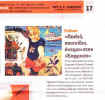 6��
6��  7�
7� 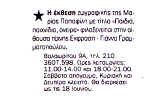 8���
8���  9���
9���  10��
10��  11��
11�� ![]() 12��
12��  13��
13��  14
14
�������� ������ ���� ����� ���� ����������� ��� �� ��� ����� �� ���������� ������� / Please click on the images to view them in bigger size.�
1. Figaro Madame. 2. ���������� / Kathimerini. 3. ������������ Apogevmatini. 4. ������������� / Eleftherotypia. 5. �� ��� / Ta Nea. 6. � ������ ��� �������� / O Kosmos Tou Ependyti. 7. ���� / Axia. 8. �� ���� / To Vima. 9. � ���� / I Hora. 10. �� ���� / To Vima.�11. �� ��� / Ta Nea. 12. � ���� ��� ��������� / I Foni tis Korinthias.�13. �� ������ / To Kerdos. 14. Athens Voice.
___________________
��� �� ��� 22/06/2005:�
"EIKA�TIKA
A�� ��� ��������� ���
�����
T����
��������� �������� ����������� ���
�� ��������� �������� ����� �����
��� ���������, ��� ��������� ��� ��
����� ��� ������� ��' ��� �������
��� ����� ������"
"...���� ������ ��� ������ �������� (��������) ������ ��� ���������� ������ ��� ����� �����, �� ����-���� ���� ���������� �������� �������� ��� �������� �������� ��� �����, ��� ���� ��� ������������ ������������ ���������, �������� �.��., �� ��� ������, ���������, ��������� ����������. ��������� ���������� ���� ��� ������. ������ �� ����� ���� ������ ��� ������ ���� ���� �� ����������� ��������, ���� �� ���� �� ������� ��� ������ ������� ����� ��� �� ������ ��� �� ������ ��� ���������� ����, ������� ��� ��� ����������� ��������� ���������, ��� ����� ��� ������������, ��� ������ �� ���� ��� �. ������ �� ������ 1955-1960. ���� �� ������ ��������� ����� ��� ���� �� ���� ����� ��� ���� �������. ����������� ��� �� ������ ��� ����� � ��������, ���� �� ���������� ������� ��������, ��������� ���� ������������ ��� ����� ��� ���� ������� ���..."
____________________________________________________________
�
� ��������� �� ����� PDF, 6.7 �� / THE EXHIBITION CATALOG IN PDF FORMAT, 6.7 MB) ��� ������������ �������� �����. ������������� ����������� ���� �� ������ ����� ��� ������������� / For strictly personal use. Reproduction permitted only with a written agreement by the artist).
�